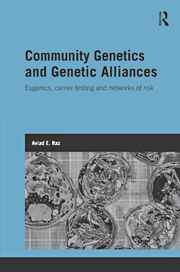

|
Recent publication:
Comparative Empirical Bioethics:Dilemmas of Genetic Testing and Euthanasiain Israel and Germany
Authors: Raz, Aviad E., Schicktanz, Silke CLICK for CONTENT and FREE PREVIEW · First book to address bioethics in a broader meaning through a German-Israeli comparison · Focuses on lay people and their patients’ perspective of life and death, eugenics and euthanasia · Compares bioethical dilemmas of predictive genetic testing and end-of-life issues · Provides new methodological and theoretical insights how to do cross-cultural bioethical studies
Reviews:
“This is a landmark study. Raz and Schicktanz have investigated ethical reasonings by expert and lay people in Israel and Germany about genetic testing and decisions at the end-of-life. In important respects, the widely shared attitudes in Germany and Israel in regard to bioethical issues appear at opposing ends of a moral spectrum. That’s why these countries are interesting to be studied comparatively. By juxtaposing different levels of comparison the authors explore how decisions are made in the context of life plans, not as individual choices, as frequently (and tacitly) assumed in bioethics. It is life-plans which make decisions meaningful. In this conceptual framework we can understand how bioethical decisions refer to cultural grammars. This study is extremely valuable because it also suggests and examines a practical methodology for doing comparative bioethics, which can be applied in other settings. It is also important since it brings reflexivity into bioethical thinking.” (Christoph Rehmann-Sutter, Professor of Theory and Ethics in the Biosciences, University of Lübeck)
“Contemporary biomedicine increases our possible control over our lives, at its different stages from womb to tomb, turning us all into lay bioethicists having to decide about how we handle genetic risk, or prepare for the end of life. Written together by a prominent bioethicist and a leading medical sociologist, whose theoretical perspectives complement one another, this extremely interesting book offers a special, empirically grounded POV on how personal, cultural and professional perspectives intertwine in every- day life in Israel and Germany. The different book chapters beautifully portray how abstract cultural ideas about knowledge, kin-responsibility, citizenship, or the sanctity of life, operate in different localities and personal lives. The book is highly recommended for all scholars of medical sociology and bioethics, and especially for anyone interested in a thorough comparative analysis in the growing field of empirical bioethics, or in specific issues such as genetic testing and end of life decisions.” (Yael Hashiloni-Dolev, Associate Professor, School of Government and Society, The Academic College of Tel-Aviv-Yaffo, Israel)
“Raz and Schicktanz make a great contribution to the emerging literature on how the public’s ethical views can be incorporated into bioethical policy. Through empirical examination of the public’s views of the ethics of genetic testing and euthanasia in Germany and Israel, we can see the distance between the views of the public and the experts, and the influence of national context. This book will not only be of great use to those interested in synthesizing expert and lay opinion in ethics, but to debates about biomedical issues in these two countries.” (John H. Evans, Professor of Sociology, Associate Dean of Social Sciences, University of California, San Diego)
Community Genetics and Genetic Alliances: Eugenics, Carrier Testing, and Networks of Risk Aviad E Raz | 208pp | HB: 978-0-415-49618-6 £80.00 £64.00
Everyone confronting the social, cultural and ethical aspects of this field should reflect carefully on what this book has to say. It is an original, empirically informed and invaluable addition to the literature.' Ruth Chadwick, Director of the ESRC Centre for Economic and Social Aspects of Genomics, Cardiff University, UK. 'Using opportunities to reduce suffering is a laudable intention, whatever it is called. The road to hell, however, is paved with good intentions too. Thanks heaven critics like Aviad Raz keep us alert by pointing out unwanted side effects. A warned human counts for two.' Leo P ten Kate, Professor Emeritus of Clinical Genetics, VU University Medical Center, Amsterdam, The Netherlands
While the interplay between carrier testing, reproduction and eugenics has sparked many discussions, this study provides a novel and much-needed perspective on its actual implementation and interpretation by community members. Conflating a cross-cultural spectrum of genetic communities, the benefits and perils of supporting (or restricting) carrier screening are located within broader social issues such as religion, ethnicity, multi-culturalism, abortion, stigmatization, suffering and care-giving. While carrier screening emerges as ultimately a morally justified pronatalist endeavour for the reduction of suffering, thus being different in principle from the 'old' eugenics, it can also carry unintended adverse consequences if left unattended to consumers, communities, or health professionals. Carrier testing of adults provides information about the risk of passing a genetic mutation to your children, leading to reproductive (and some say, eugenic) decisions. Excessive carrier screening may have adverse effects, but it can also prevent suffering and open up new reproductive options. Raz's study focuses on the interplay of community genetics (the medical organisation of carrier screening) and genetic alliances (networks of individuals at risk), exploring how 'genetic communities' are emerging both within existing ethnic groups and around patients' organizations. Order a copy at: www.routledge.com/9780415496186 |
